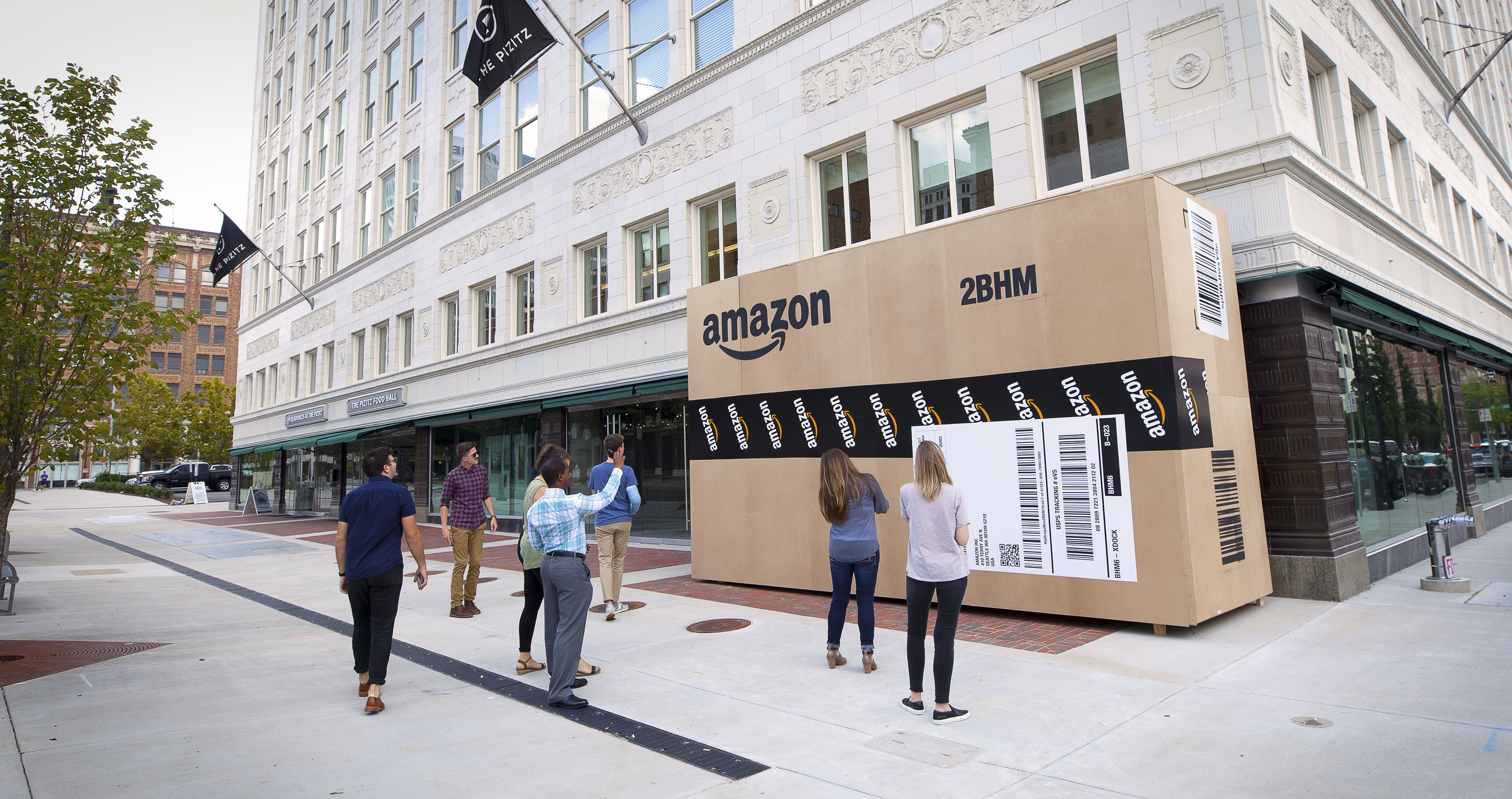Vying for Amazon's new HQ
After Amazon announced that it was hunting for "Amazon HQ2," 238 cities and towns threw their hats into the ring

A free daily email with the biggest news stories of the day – and the best features from TheWeek.com
You are now subscribed
Your newsletter sign-up was successful
The smartest insight and analysis, from all perspectives, rounded up from around the web:
Tucson sent a 21-foot cactus to Jeff Bezos. Birmingham, Alabama, installed giant delivery boxes around town. And Stonecrest, Georgia, offered to rename itself Amazon. When you're gunning to be the home of Amazon's second headquarters, you "need something to set yourself apart," said Nathan Bomey at USA Today. After the e-commerce giant announced in September that it was hunting for the perfect "Amazon HQ2" location, promising to invest $5 billion and create 50,000 high-paying jobs, 238 cities and towns eagerly threw their hats into the ring, with the application period ending last week. Some launched "downright wacky" stunts, while others dangled more traditional sweeteners, like the $7 billion in tax breaks offered up by Newark, New Jersey. If there are early front-runners for this "civic beauty pageant," Amazon isn't saying, said Matt Day at Seattle Times. But based on the company's lengthy wish list — a population of at least 1 million, good mass transit, a well-educated labor force — analysts "have some guesses." Moody's Analytics crunched the numbers and named Austin, Atlanta, Philadelphia, Pittsburgh, and Rochester, New York, as "best positioned" to win.
Cities in the running should "be careful what they wish for," said Timothy Egan at The New York Times. "Well before Amazon disrupted books, music, television, furniture — everything — it disrupted Seattle." Here in the home of its first HQ, Amazon has detonated a "prosperity bomb." Sure, we got tens of thousands of high-paying jobs. But the median home price has doubled in the past five years, to $700,000. The traffic is maddening, and Amazon occupies a full fifth of our best office space. The company has quite simply altered our city in ways residents "never had any say over." The victor will no doubt have to fork over billions in tax breaks, said Katy Steinmetz at Time. That's likely to be a raw deal for locals, because when a company attracts new people to a region, public costs — "hiring more teachers, fielding more 911 calls, widening roadways" — often rise substantially. If Amazon gets a pass on contributing, residents will be rewarded with "a higher tax bill."
The Week
Escape your echo chamber. Get the facts behind the news, plus analysis from multiple perspectives.

Sign up for The Week's Free Newsletters
From our morning news briefing to a weekly Good News Newsletter, get the best of The Week delivered directly to your inbox.
From our morning news briefing to a weekly Good News Newsletter, get the best of The Week delivered directly to your inbox.
I think it's "obnoxious for a healthy company to insist on getting these enticements," said Robert Reed at the Chicago Tribune, but "it's now a fact of corporate life." If one city doesn't play ball, another one will. But in this case, the benefits "outweigh the publicly backed giveaways." Chicago's bid estimates that Amazon could generate $341 billion for the local economy over the next 17 years. Still, I'd like to appeal to Jeff Bezos' better angels, said Virginia Postrel at Bloomberg. Does he want to be a "responsible corporate citizen" and use this opportunity to challenge civic leaders to create better cities for residents? Or does he want Amazon to "go looking for handouts"? As it weighs its many options, Amazon "should consider what its high-profile decision says about its values, priorities, and identity."
A free daily email with the biggest news stories of the day – and the best features from TheWeek.com
-
 Crisis in Cuba: a ‘golden opportunity’ for Washington?
Crisis in Cuba: a ‘golden opportunity’ for Washington?Talking Point The Trump administration is applying the pressure, and with Latin America swinging to the right, Havana is becoming more ‘politically isolated’
-
 5 thoroughly redacted cartoons about Pam Bondi protecting predators
5 thoroughly redacted cartoons about Pam Bondi protecting predatorsCartoons Artists take on the real victim, types of protection, and more
-
 Palestine Action and the trouble with defining terrorism
Palestine Action and the trouble with defining terrorismIn the Spotlight The issues with proscribing the group ‘became apparent as soon as the police began putting it into practice’
-
 The pros and cons of noncompete agreements
The pros and cons of noncompete agreementsThe Explainer The FTC wants to ban companies from binding their employees with noncompete agreements. Who would this benefit, and who would it hurt?
-
 What experts are saying about the economy's surprise contraction
What experts are saying about the economy's surprise contractionThe Explainer The sharpest opinions on the debate from around the web
-
 The death of cities was greatly exaggerated
The death of cities was greatly exaggeratedThe Explainer Why the pandemic predictions about urban flight were wrong
-
 The housing crisis is here
The housing crisis is hereThe Explainer As the pandemic takes its toll, renters face eviction even as buyers are bidding higher
-
 How to be an ally to marginalized coworkers
How to be an ally to marginalized coworkersThe Explainer Show up for your colleagues by showing that you see them and their struggles
-
 What the stock market knows
What the stock market knowsThe Explainer Publicly traded companies are going to wallop small businesses
-
 Can the government save small businesses?
Can the government save small businesses?The Explainer Many are fighting for a fair share of the coronavirus rescue package
-
 How the oil crash could turn into a much bigger economic shock
How the oil crash could turn into a much bigger economic shockThe Explainer This could be a huge problem for the entire economy